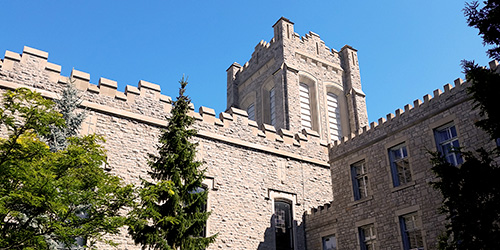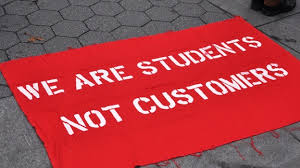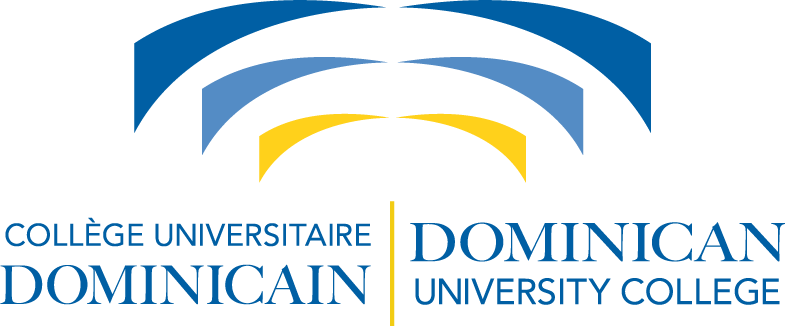Blog - Blogue

Homeschooling and DUC

By Joseph Yawney
Open House for Homeschoolers
When: March 21st, 2015, 11 am - 2 pm
Where: Dominican University College
96 Empress Ave.
To register: Please email welcome@dominicanu.ca by March 20th
Homeschoolers and DUC have a long history. We’re a natural fit in many regards. There have been numerous occasions when one unsuspecting teen signs up for a single course while completing their high school, only to find themselves 3 degrees later still with us, having encouraged all their siblings to join them in the meantime.
DUC is not necessarily part of the unschooling or alternative education movement, though we are at home with these philosophies in many ways. It's a question of “methods” and to a large degree a question of “ends”.
We are a post-secondary institution affiliated with Carleton University and accredited by the province of Ontario. We have to toe the line in terms of producing curriculum that has been approved by governing bodies and we need to make sure students are meeting the basic requirements within our programs.
But it doesn’t mean we can’t have fun!
The manner in which students are encouraged to learn and pursue their personal questions, the educational methods at DUC, bode well with many alternative education movements. Often enough, students can choose their own exam questions, essay topics, and ask questions that they care about in a classroom setting. DUC is a place that’s not afraid of thinking differently, of thinking big, and it’s especially fond of unthinking. Of trashing sacred cows in order to build better approaches to problems.
Though we follow the general rubrics necessary to fulfill provincial academic requirements, academic freedom and the communal pursuit of wisdom are more than just fancy accolades within these beautiful gothic walls, so well-suited to contemplation.

It’s our bread and butter.
It’s that for which we live.
The devolution of classical education has led to a mainstream movement towards education as a tool: learning for profit, if you will. The proof of this is that all important question:
“What are you going to do with that”?
Well-meaning adults everywhere bedevil youth with this question to the point where anything but the almighty $ is seen as circumspect motives for learning. Christmas dinners, small-chat in the dentist office . . . casual conversation with strangers and longtime relatives alike . . . these can all amount to stressful, awkward experiences for students of anything but one of the traditional “money-making” disciplines. Mr. O’Leary leads the charge in this regard (watch 3 min in).
This, I believe, is where homeschooling/unschooling and DUC most truly come together.
It’s a question of “ends”.
What are we in it for?
Various answers come about.
Though a surprising variety of profitable and respectable careers are available to philosophy and theology students, money is not usually the primary motivation for students entering our doors:
“I wanted to”
“It makes me happy”
“I had questions I needed to answer”
“I wasn’t happy with the status quo”
“There had to be a better way to think these things through”
“I don’t know . . . Yes. I’d do it again”
These are some of the responses you’ll get when asking our students why they began with us. They are some of the same responses that parents give when asked why they chose to instruct their children outside of mainstream education.
What’s at stake here is the pivotal question on which the future of education hinges.
The alternative, a continued focus on practical sciences divorced of any consideration of what was traditionally called the highest sciences (philosophy and theology), is not pretty.
The hollowing out of educating into a utilitarian pursuit has left a sea of unhappiness in its wake. This is evidenced by:
-
people switching jobs every two years.
-
Astronomical rates of dissatisfaction in the workplace.
-
Trouble with work-life balance.
-
Struggles with existential questions.
-
Lack of motivation.
-
Depression.
The list goes on. People need to be able to frame questions within a larger context. This larger context is not possible for students who have a sole focus on the immediate, concrete framework which is presented within the “hard” sciences.

Society needs people who are well-rounded in our increasingly complex, interrelated and interdependent culture. Are thinking about human needs should encompass more than dollars in a bank account. People need to understand themselves as thinkers and actors within a larger system, for their own good and that of society. Mr. O’Leary fails to see that his passion for making money as the sole purpose for living is not ubiquitous. When people’s days end, some have greater hopes than multi figure bank accounts. As a society, as a community, we need to take stock.
What are we living for?
When we’re willing to entertain more creative answers than Mr. Greenback, we will allow space for education to return to its roots. A love of knowledge and the pursuit of wisdom will be given a chance to find a new birth within our youth, leading to a society where adults have a better handle on the deeper realities that they care about. And these deeper realities can then better guide us in our work and life choices.
